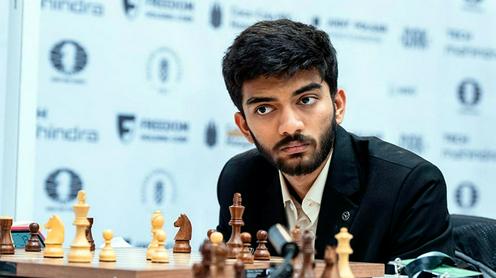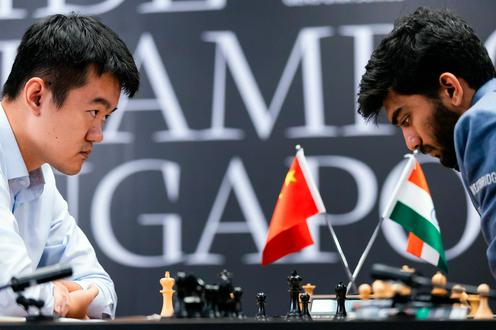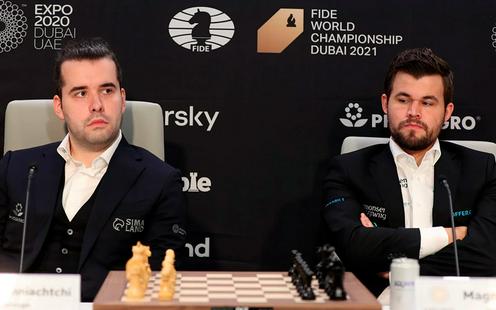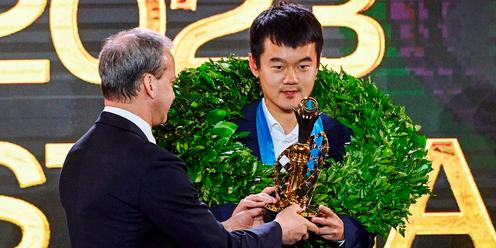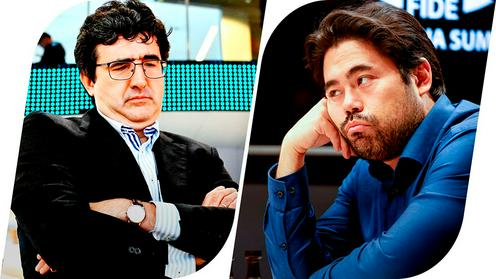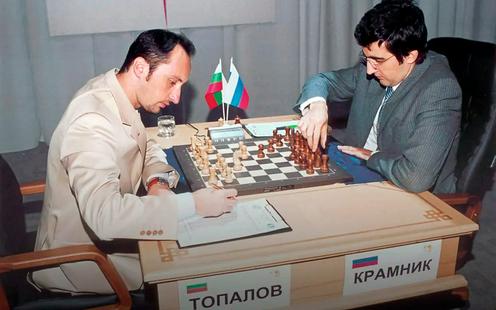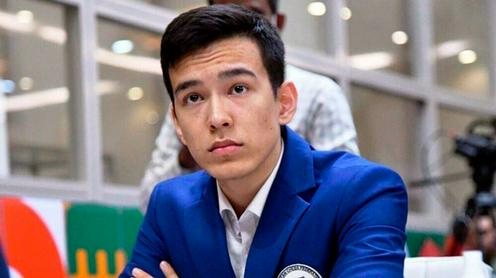Last week, the World Chess Championship match concluded in Singapore, where Gukesh Dommaraju, an 18-year-old Indian chess prodigy, defeated Chinese grandmaster Ding Liren to become the youngest World Chess Champion in history. However, the match, which should have been a celebration of chess, stirred public debate and sparked numerous concerns. Like a litmus test, it revealed the deep-rooted problems currently plaguing the chess world.
*
The results of the match unexpectedly sparked a scandal. However, it wasn’t in India, nor even in China, but strangely in Russia.
In the final game, the 17th World Champion, Ding Liren, made a surprising blunder — one that was elementary for a super grandmaster. The position on the board was a drawn one, and chess enthusiasts were already anticipating a thrilling tiebreaker. Then, out of nowhere, the Chinese grandmaster placed his white rook on the f2 square with the wrong hand. The position became lost, and within a few moves, Ding Liren resigned the game and the match.
Such mistakes, though rare, do happen to elite players and even to world champions. Nerves, immense responsibility, and pressure from all sides — and just like that, the champion becomes the former champion, heading back to China to console himself with Sichuan noodles and Kung Pao chicken.
However, the Chinese blunder sparked a storm of emotions within the Russian chess community. The 14th World Champion Vladimir Kramnik was so upset by the match that he even predicted the end of chess as we know it.
«Sad,» Kramnik wrote. «The end of chess as we know it. Never before has the outcome of a World Championship match been decided by such a childish blunder in a single move."
Some journalists went even further, claiming that Ding Liren had been punished by the rulers of karma — for beating Ian Nepomniachtchi in the previous match, when, it seemed, he should have lost out of pure respect.
However, the most vocal was the President of the Russian Chess Federation, Andrei Filatov. He declared that even a first-class player would have struggled to lose such a position, and therefore, Ding Liren’s defeat appeared to be intentional. He then called on the International Chess Federation (FIDE) to conduct an investigation.
An obvious question arises: what did Filatov mean? Did the competitors make a deal, and Ding Liren simply threw the match to his opponent? This theory is undoubtedly credible, especially when it comes from a businessman included in the Russian Forbes list. It’s likely that the chess community should consider the opinion of an experienced person who understands how big deals are made. At the very least, to argue with him effectively, one would need to have a billion or two in their bank account.
However, the same accusation could be made against any defeated player. For example, Russian chess player Ian Nepomniachtchi, who lost to Magnus Carlsen in 2021 with a crushing score. In such cases, any match where one side wins could potentially be called fixed — not only in chess but in any sport.
However, if we’re to take this seriously, we need to understand the context of the match — both political and chess-related.
*
The political collision stems from the long-standing rivalry between China and India. This conflict has deep roots, with numerous causes, starting with India granting asylum to the Dalai Lama, whom Chinese authorities consider a separatist, and extending to the unresolved territorial dispute between the two Asian giants.
This is why the Indian player became the most formidable opponent for the Chinese grandmaster, and why Ding Liren had to retain his title — to avoid incurring the anger and even contempt of his fellow countrymen. The Chinese player had no moral right to lose to an Indian — and vice versa. In such circumstances, any talk of «throwing» the match is out of the question; the fight had to be completely uncompromising.
The chess context leading up to these events became even more tense. In July 2022, the sixteenth World Champion, Norwegian Magnus Carlsen, suddenly announced that he would not defend his title in a match against Nepomniachtchi, and relinquished his responsibilities.
This statement shocked and bewildered the chess world. The last person one would expect such a move from was Carlsen.
The Norwegian became a legend while still a young man. He displayed brilliant play in tournaments, outclassed all of his contemporaries, and achieved the highest Elo rating in chess history — 2882 points. The previous record belonged to Garry Kasparov — 2851. Moreover, Magnus competed with Kasparov for the title of greatest chess player of all time. Carlsen himself considers Kasparov the greatest, while Kasparov, in turn, speaks of Carlsen's unique talent.
Among grandmasters, a saying emerged: «Everyone plays, but Carlsen wins."
And then, in the summer of 2022, Carlsen announced that he would not defend his title.
Something similar had happened in chess history before. In 1975, a match was supposed to take place between the reigning champion, Robert Fischer, and Soviet grandmaster Anatoly Karpov. However, Fischer presented unacceptable conditions. FIDE did not meet his demands, Fischer refused to play the match, and Karpov was declared the world champion. However, Fischer was known for his unpredictability and complex character; he was a paranoid person. For example, he believed that all Soviet grandmasters were KGB agents and that Zionists had taken over the world.
Nothing like this can be said about Carlsen. He is a man with nerves of steel and without prejudice. He sometimes compares himself to a crocodile — for his composure, cool-headedness, and iron grip. Furthermore, Carlsen was set to play against a familiar challenger — Ian Nepomniachtchi. A year earlier, Carlsen had already beaten him with a significant margin, specifically 7½ — 3½. Nepomniachtchi didn’t win a single game, and the match ended prematurely.
Of course, such a score did not reflect the true balance of power. Nepomniachtchi is a strong and very talented grandmaster, but clearly, he struggled with his nerves. In any case, Magnus was the undisputed favorite for the upcoming match. So why, in this case, was the Norwegian so afraid? Why did he refuse to play again against an opponent he had already defeated with such a convincing score? The only person who could provide a precise answer to this question was the sixteenth world champion himself. And he did.
Carlsen stated that he was refusing to play because he was only interested in facing Ali Reza Firouzja—the French super grandmaster from Iran. However, Firouzja did not make it through the qualifying rounds, and no other chess players were of interest to Carlsen. Therefore, he would not defend his title.
Sadly, this explanation doesn't seem very plausible. In a World Championship match, there are other interests at play besides just the sporting and creative ones. For example, if Magnus had relaxed and simply lost to Nepomniachtchi, he would still have earned about a million dollars in prize money—quite a sum even for a world champion. But Carlsen chose not to play and preferred to leave undefeated.
*
Thus, for the first time since 1975, the chess world was left without a champion. Following everyday logic, the winner of the Candidates Tournament, Nepomniachtchi, should have been declared the new champion. However, modern sports, above all, are about bureaucracy, and bureaucracy means regulations. According to FIDE's rules, in the event of Carlsen's withdrawal, the title of champion had to be contested between the winner of the Candidates Tournament, Jan Nepomniachtchi, and the runner-up, Ding Liren.
The Chinese grandmaster had long shown exceptional results, but in this pairing, he was still considered the underdog, with Nepomniachtchi being the favorite. This is how his Russian supporters viewed it, and likely how Jan himself thought as well. At least, the game he played in the match was bright, aggressive, and, as they say, reckless. Ding Liren played in a similar fashion. The match, which took place in 2023 in Astana, was full of numerous blunders, resembling a seesaw where the advantage kept shifting from one side to the other.
In Soviet times, commentators would have called such a contest a «comedy of errors,» but nowadays, simpler expressions are used.
«Two fools are a force,» commented the unfortunate match by renowned Russian grandmaster Dmitry Andreikin, who now lives in Kazakhstan.
This comment sounded somewhat offensive. Perhaps outside of the chessboard, Nepomniachtchi and Ding Liren are not intellectual giants, but they are far from being fools. However, Andreikin's remark was not official; it was made during his stream, and the grandmaster immediately apologized for the poor joke.
Nevertheless, in the match against Nepomniachtchi, Ding Liren proved to be more fortunate and became the new world champion, the first among Chinese chess players. This was a groundbreaking achievement: Chinese men had long struggled to win the championship, even though Chinese women had been dominating chess for decades. Since 1991, six Chinese women have been world champions: Xie Jun, Zhu Chen, Xu Yuhua, Hou Yifan, Tan Zhongyi, and Ju Wenjun.
Now, a Chinese man has become the world champion. It was not an easy feat for him, and his nerves were severely tested. During the match, Ding Liren exhibited psychological instability, changing hotels and clearly feeling immense pressure.
Nonetheless, Ding Liren won the match. No matter how nervous he was, Nepomniachtchi seemed to be even more on edge.
After the match, both players were received by Kazakhstan's president, Kassym-Jomart Tokayev. He even spoke with Ding Liren in Chinese, a language he is fluent in, having studied it at MGIMO and during his internship at the Beijing Linguistic Institute in China.
Unfortunately, after defeating Nepomniachtchi, the Chinese grandmaster did not find peace. Ding Liren's sporting results began to decline sharply; after becoming champion, he didn't win a single tournament. Moreover, over the past two years, the Chinese player lost eighty rating points, dropping to 22nd place in the global standings, which is almost humiliating for a reigning champion.
Almost immediately after the match, in an interview with Chinese media, Ding stated that the chess crown was too heavy for him and that he did not enjoy public attention or media scrutiny.
Nevertheless, he did not follow in Carlsen's footsteps and did not refuse to play against Gukesh.
*
Now, perhaps it's time to try to understand why Carlsen voluntarily relinquished his title and why the World Championship matches have taken on an extravagant, almost caricature-like quality. To understand this, one must look at what modern chess has become.
The COVID-19 pandemic, which began in late 2019, locked billions of people in their homes. The pandemic hit athletes’ earnings hard, including professional chess players. No tournaments meant no invitations, and consequently, no prize money. Fortunately, the internet came to the rescue: instead of live tournaments, online competitions began to take place.
Online chess has actually been around for quite some time. In 2002, FIDE even held the first World Chess Championship online. The winner of this event was International Master Nikolai Vlasov. Strong grandmasters did not participate in this tournament, but it did witness one of the earliest cheating scandals in chess history, involving a player named Rafal Furdzik. According to Vlasov, FIDE accused Furdzik of using computer assistance. At the time, chess programs were much weaker than those used today, but still powerful enough to beat mid-level grandmasters.
Businesspeople close to the sport quickly realized that online competitions were a goldmine. In 2007, the largest online chess platform, Chess.com, was launched. A few years later, in 2010, another internet giant, Lichess, emerged. Initially, the internet was primarily home to amateurs, but gradually, qualified chess players, including super grandmasters, started joining. Some played under their real names, while others used nicknames. For example, Magnus Carlsen went by DrNykterstein, Ian Nepomniachtchi chose the name of the Greek goddess of fate, Lachesis, and Hikaru Nakamura simply used Hikaru.
However, online chess truly flourished during the COVID pandemic. For professional chess players, it became a lifeline. Firstly, strong sparring partners were always available, and secondly, players could engage in blitz games in online tournaments like «Title Tuesday» on Chess.com or «Title Arena» on Lichess. Compared to large live tournaments, the prize money in these events was relatively small — up to $1,000. However, for an amateur or even an average grandmaster not invited to top-level competitions, these were decent sums, and they could be earned in just one evening. Such tournaments occur frequently throughout the month, so with a bit of luck, it's possible to make a living from them.
And here's where the real issue begins: cheating.
Are there cheaters everywhere?
The term «cheating» comes from the English verb to cheat, meaning to deceive or trick. In the context of chess, it usually refers to the use of computer assistance. The current level of chess engines is such that no human has any chance against them. Competing against a chess program is like a runner trying to race a sports car.
Of course, in live tournaments, using a computer for assistance is difficult — digital devices are prohibited in the playing area. However, it's nearly impossible to monitor a player sitting at home at their computer. There are ways to detect it, such as installing additional cameras in the player's home, but this is a complicated and burdensome process, and it's not done very often.
The easiest way to catch a cheater is if they consistently make only the best moves suggested by the computer, or as chess players say, play «on the first line.» Slightly more sophisticated cheaters will play most of the game on their own and only resort to the computer’s help in critical moments. However, such players can be detected simply by the results. For example, in a «Title Tuesday» tournament, if an unknown candidate master starts defeating Carlsen, Nakamura, Nepomniachtchi, and other super grandmasters one after another, there's no need to analyze their games: it's clear that this is a cheater.
And yet, cheating remains a scourge of modern chess.
Naive people think that only amateurs use assistance, while chess professionals disdain it to preserve their reputations. In reality, this is not the case. Chess is played by ordinary mortals, not pillars of morality — they just happen to be skilled at moving pieces on the board. When choosing between fair play and the chance to earn money, chess players often choose the latter.
Even super grandmasters have been caught up in cheating scandals. For example, the fourteenth World Champion Vladimir Kramnik suspected American Hikaru Nakamura of online cheating. Nakamura is currently ranked third in the world with a rating of 2802. Kramnik supported his suspicions with mathematical calculations. In response, Nakamura said that Kramnik didn’t have a brain. According to Kramnik, his anti-cheating activities even led to threats from various people.
Kramnik, however, didn’t take these threats too seriously. Of course, the fourteenth World Champion is not in the best physical shape at the moment, but if it came down to a confrontation, Nakamura would have a tough time. Kramnik is 195 centimeters tall and weighs well over 100 kilograms. He wouldn't even need to fight; if he simply fell on Nakamura, the matter would be immediately settled in his favor, and it would become clear who has the moral and ideological superiority.
In addition, Kramnik has accused Chess.com of not adequately fighting cheating, or rather, of not fighting it enough. And indeed, is it in the interest of chess platforms to combat cheating? After all, this possibility attracts tens of thousands of players — thanks to cheating, they can play with the strongest grandmasters, with whom they would never meet in real life. It's quite nice to casually mention, while sitting in the office, “Yesterday I beat Carlsen and Nakamura online.” And even if you beat them dishonestly, using a computer — who cares about such details?
In any case, it is Vladimir Kramnik who has led a targeted fight against cheating in recent years, and he has even earned the nickname «cheater-paranoid» from his adversaries, meaning someone who sees cheating everywhere. These same adversaries didn't hesitate to remind the justice fighter about the famous «toilet scandal."
This scandal occurred in 2006 in Elista during the World Championship match between Vladimir Kramnik and Bulgarian grandmaster Veselin Topalov.
The match started with two losses for Topalov. With the score 3:1 in Kramnik’s favor, the challenger’s team filed a protest, claiming that the fourteenth world champion was going to the bathroom too frequently. The protest contained an unmistakable suggestion that Kramnik, while in the restroom, could be using computer assistance. The appeals committee agreed with this and deprived Kramnik of his personal bathroom, ordering him to share a restroom with Topalov. Kramnik was outraged by this decision and even refused to play the fifth game, which was counted as a technical loss for him.
Later, the press attaché of the Bulgarian delegation, Zhivko Ginchev, published a book titled Toilet War: A Chess Drama in 13 Acts. He claimed that in Kramnik’s bathroom, a computer cable was allegedly found, through which the fourteenth world champion could receive hints. Kramnik later denied any accusations of cheating, explaining his frequent bathroom visits as due to health issues.
Fans of the Bulgarian grandmaster sarcastically joked that Kramnik was running to the bathroom because he was afraid of Topalov. Kramnik's supporters, however, insisted that a man who had beaten Kasparov in a match wasn’t afraid of anyone, so there was no reason for him to avoid the bathroom for years.
In any case, no conclusive evidence of Kramnik's cheating was found at that time, but as they say, the residue remained. Now, Kramnik himself has become the leading fighter against chess cheats.
*
However, nowadays, catching a smart cheater red-handed is much more difficult than it used to be. Mathematical algorithms for detecting cheating do not offer a 100% guarantee. Famous Russian grandmaster and 2018 World Rapid Chess Champion Daniil Dubov says that a strong chess player doesn't need assistance throughout the entire game: it's enough for a red «winning move available» light to appear at a critical moment, and then he will focus and find the winning move himself.
One of the most high-profile cheating scandals—involving over-the-board chess—occurred with Magnus Carlsen, and in this case, the champion was, of course, the victim.
In September 2022, the Sinquefield Cup was held in St. Louis. In the third round, Carlsen faced the 19-year-old American Hans Niemann. Niemann had the lowest rating of any player in the tournament, yet he convincingly defeated Carlsen. This wasn’t the first time a young player had beaten the world champion, but this time, Carlsen’s reaction shocked everyone. Magnus withdrew from the tournament voluntarily before finishing his games. Shortly thereafter, a video appeared on his Twitter account, where José Mourinho said: “I prefer not to say anything. If I speak, I will have big problems.” While this was not a direct accusation, the implication was clear: Hans was a cheater.
The fire was further fueled by one of the strongest grandmasters in the world, Hikaru Nakamura. He reminded everyone that Nimhann had already been banned from Chess.com for cheating. However, at the tournament in Saint Louis, strict measures were taken against cheating, and all digital gadgets were confiscated. The question then arises: how could Nimhann have received assistance?
The answer came from none other than Elon Musk, and, of course, it was in the spirit of the American billionaire. According to Musk, Nimhann could have inserted a vibrating device into his rear, which would transmit the correct moves. It sounds like a silly joke, doesn't it? However, Wikipedia reports that English journalist Daniel Fernandez conducted an experiment with such a device and managed to beat an unnamed grandmaster.
Nevertheless, Nimhann denied any wrongdoing, rejected any connection with vibrating devices, and sued Carlsen, Nakamura, and Chess.com, accusing them of defamation and demanding $100 million in compensation. Eventually, the parties reconciled and announced that there were no further claims against each other.
Whether Nimhann played in Saint Louis with his head or his rear remains a mystery. Nimhann himself claims that he only cheated in his youth and exclusively in online chess, and that he has always played fairly in over-the-board games. It’s worth noting that two years after the scandal, Hans Nimhann managed to significantly improve his rating and now occupies the 18th position in the global rankings. Given the precautionary measures taken against Nimhann after the Carlsen scandal, it would be difficult for him to achieve such success through cheating today.
*
However, let’s return to Carlsen's decision to relinquish his title as world champion. It is unlikely that the rise of cheating directly influenced his decision, but there is a version that online chess may have had a direct impact.
Carlsen, like most top grandmasters, has long participated in online tournaments like “Title Tuesday.” These blitz tournaments usually last no more than three hours, so from a professional chess player’s perspective, the workload is relatively light. However, blitz tournaments have one insidious characteristic — when a chess player loses a blitz game, they experience almost the same level of stress as if they had lost a game in a major over-the-board tournament.
Moreover, in online tournaments, the chance of encountering a cheater is much higher than in a real tournament. Losing to a candidate or a master feels much worse for a super-grandmaster than losing to someone of equal skill. Thus, online blitz tournaments lead to psychological burnout much faster and more intensely than over-the-board chess.
At times, a grandmaster plays as many games online in a week as they would in a year in real-life tournaments. Many assume it's just a form of entertainment with no serious consequences. However, if you observe a player's reactions, it becomes clear that blitz games put a significant mental strain on them, comparable to that of live chess games. The problem is exacerbated by the fact that grandmasters, after finishing a game in a live tournament, often go back to their rooms and instead of resting, play blitz online.
As a result, a chess player's nervous system becomes depleted much faster, and they can no longer concentrate during long hours of over-the-board chess. Furthermore, why would they bother, especially if, like Magnus Carlsen, they've already been world champion? In the 20th century, the world champion was seen as a deity, but now they’re just a guy making good money from chess. It's possible that it was the exhaustion of his nerves that led Carlsen to decide not to defend his title.
The strained nerves can cause unpredictable reactions even in crucial competitions like the World Chess Championship match. This explains why Ding Liren didn't «throw» the match — he simply couldn't handle the pressure. On the other hand, young Gukesh still has strong nerves. Even if he might lag behind Ding Liren in pure chess skills, as an athlete, he clearly outshines him. It turns out that it wasn't a chess player defeating another chess player, but rather a 32-year-old man failing to compete with an 18-year-old.
It is also worth mentioning that online blitz tournaments significantly affect not only the nervous system but also modern chess itself. Even in over-the-board tournaments, there are many more mistakes, blunders, and missed moves, with important decisions sometimes made without proper reflection.
One of the world's strongest grandmasters, Levon Aronian, has said the following on this matter: «The game has changed, it has become less deep. We have unlearned how to play deep chess. I myself have unlearned. There is so much blitz and rapid chess now that the skill of prolonged concentration is lost."
The solution to this problem is difficult to determine. Many top grandmasters, including Ian Nepomniachtchi, predict the death of classical chess with traditional time controls — only fast chess (no more than an hour per game), blitz (3-5 minutes), and bullet (1-2 minutes or less) will remain. According to Nepomniachtchi, this will happen within the next ten years.
However, this is the most pessimistic view. Chess has existed for centuries and even millennia, constantly evolving and managing to survive in some form. In any case, it's still too early to write off this ancient game.
Where will the new champion come from?
In light of the above, the natural question arises: what does the future hold for the World Chess Championship? Do Central Asian chess players have a chance to join the ranks of the champions?
I’ll say it right away: there are definitely chances, and they are significant. At the moment, the strongest chess players in Central Asia are from Uzbekistan, and this is no coincidence. Back in the 1980s, the first grandmaster of Central Asia was the Uzbek player, Georgiy Agzamov. Twenty years later, in 2004, another Uzbek grandmaster, Rustam Kasimdzhanov, became the World Chess Champion under FIDE. This was undoubtedly a breakthrough for Uzbek chess.
Since then, Uzbekistan has seen a rise in a group of strong chess players. In August 2022, the Uzbek team sensationally won the Chess Olympiad — the world’s premier team competition. At the time, not a single grandmaster from the winning team was ranked in the top 50 of the world. Even the team leader, seventeen-year-old Nodirbek Abdusattorov, was only ranked 64th in the world. In the two years since the Olympiad, Abdusattorov became the World Rapid Chess Champion. Now, he is ranked 6th in the world, just behind the new World Champion, Gukesh, who holds the 5th spot. No Uzbek player, not even Kasimdzhanov, has risen this high.
Of course, Abdusattorov showed extraordinary talent from a young age, becoming an International Grandmaster at just thirteen years and one month old. However, the “Uzbek wonder” didn’t happen in a vacuum. In recent years, the government of Uzbekistan has given exceptional attention to chess — and the results have been evident.
Indeed, in the chess world, Abdusattorov is considered an extraordinarily gifted and promising player, making it highly likely that he will challenge for the World Chess Championship title in the upcoming cycle, potentially facing Gukesh. The only advice that could be given to Nodirbek in this regard is to avoid getting too caught up in online tournaments. At least, not until he becomes the new chess king.
-
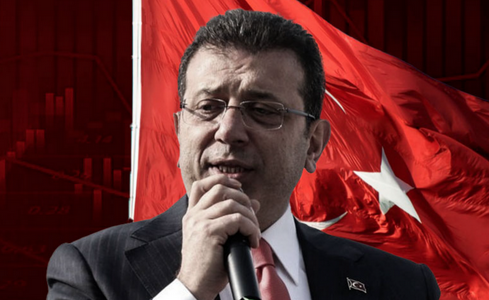 26 March26.03Turkey’s Opposition HopeThe Arrest of Ekrem İmamoğlu and Its Political Consequences
26 March26.03Turkey’s Opposition HopeThe Arrest of Ekrem İmamoğlu and Its Political Consequences -
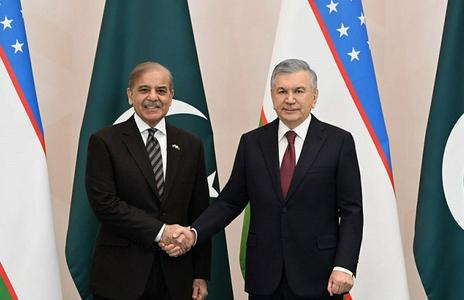 26 February26.02Uzbekistan and Pakistan to Establish Joint Transport and Logistics Company
26 February26.02Uzbekistan and Pakistan to Establish Joint Transport and Logistics Company -
 25 February25.02“The Best Candidate for UFA President Is Someone with Access to State Financial Resources”— Alisher Aminov on the Stark Reality of Uzbek Football
25 February25.02“The Best Candidate for UFA President Is Someone with Access to State Financial Resources”— Alisher Aminov on the Stark Reality of Uzbek Football -
 14 February14.02Make Central Asia…How U.S. President Donald Trump's Policies Will Affect the Region
14 February14.02Make Central Asia…How U.S. President Donald Trump's Policies Will Affect the Region -
 29 January29.01Warming the New Year at HeartDelving into the intricacies of the snake image in Chinese culture
29 January29.01Warming the New Year at HeartDelving into the intricacies of the snake image in Chinese culture -
 24 January24.01Distinguishing Between Good and EvilWhy Migrants Find It So Hard to Fit In in Russia
24 January24.01Distinguishing Between Good and EvilWhy Migrants Find It So Hard to Fit In in Russia
